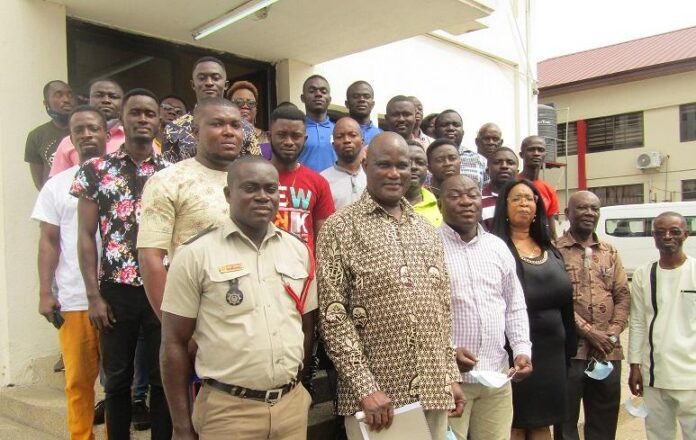The Environmental Protection Agency (EPA) has directed Liquefied Petroleum Gas (LPG) Pump Attendants not to refill customers defective Gas Cylinders as it has contributed to incidence of domestic gas fires.
“Pump Attendants must counsel customers who presents defective cylinders for refilling, to understand the dangers associated with using substandard gas cylinders,” Mr John Alexis Pwamang, the EPA Acting Executive Director stated during training of LPG Pump Attendants in Accra.
The EPA Executive Director advised LPG Pump Attendants to mark any defective gas cylinders with red indelible ink to serve as a warning to both the owner and other Pump Attendants of the danger associated with refilling that particular cylinder.
As part of a broader process to inject professionalism into the sector and to reduce accidents connected with gas usage, the EPA has initiated a process of licensing all LPG Pump Attendants.
The training forms part of the general requirements for the licensing regime which would ensure that people who are not trained cannot operate as LPG Pump when the regulations comes into force.
Mr Pwamang, told the Ghana News Agency in an interview, at the end of the three day training programme that LPG Attendants must go through “Environmental Safety and Best Practices Training (ESBPT)”.
The ESBPT syllabus is divided into phases, which involves theoretical classroom and practical field training, leading to the award of an initial certificate of participation, after which the attendants would be monitored for adherence to best practices.
He said the Attendants would again go through another theoretical classroom and practical field training at the end of which he or she would be licensed to operate as a Certified Professional LPG Pump Attendants.
Mr Pwamang said the next group will start from Tuesday August 25 to Thursday August 27 and therefore appealed to LPG Owners and Dealers as well as Pump Attendants to enroll in the on-going EPA Environmental Safety and Best Practices Training.
He said the Regional Training would start in September from Kumasi and rolled-over to other regions to raise awareness about the hazards of LPG and the preventive mechanism available.
He said the training would also target Owners, Dealers, and Station Supervisors to ensure that “we adhere to international best practices in our operations in the country.”
Mr Pwamang explained that the certification emanated from the background that the series of gas explosions and gas-related fire outbreaks in the country, which had resulted in the loss of lives and property was attributed to lack of understanding and failure to observe simple safety protocols.
He said investigations into these incidents and accidents revealed several causes, the most critical and common one being that most of the workers along the supply chain did not have the requisite knowledge and skills required to work.
“It is as a result of these revelations that the regulatory institutions decided to organsise a training programme to train and certify all the operators to ensure that LPG risk is reduced to the minimum in the country,” the EPA Executive Director stated.
Mr Pwamang said all actors including regulators, investors, dealers, attendants, and consumers needed to work together to reduce the hazards associated with the usage of LPG.
“We have LPG around us in our homes, cars, workplaces, and restaurants among others. We, therefore, need to understand its proper usage”.
“As a major player in charge of environmental protection, we have identified education as a missing link, therefore we want to build the capacity of station attendants who play a critical interface in the whole operations of selling LPG to end-users.”
He said EPA was collaborating with other technical partners such as the Ghana National Fire Service, Ghana LPG Operators Association (GLiPGOA), Department of Factories Inspectorate, National Petroleum Authority among others.
He called on the LPG Marketing Companies Association and other stakeholders to ensure their attendants participated in the training as well as dealers and owners to help protect their investments.
SOURCE
GNA

